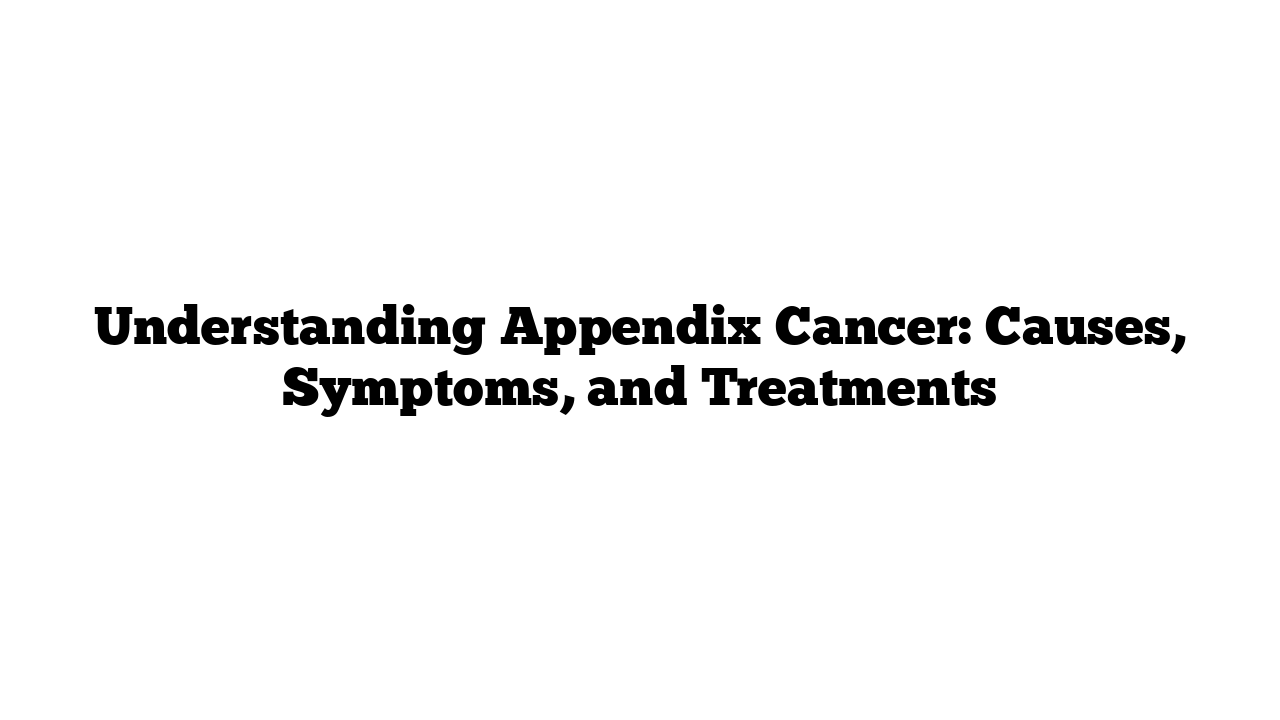Appendix cancer is a rare but complex condition that many people may not be familiar with. Despite its rarity, it’s essential to understand the signs, risk factors, and treatment options to seek help when needed. This guide offers a detailed explanation to make the topic easy to understand and approachable.
What is Appendix Cancer?
Appendix cancer refers to the uncontrolled growth of abnormal cells in the appendix, a small tube connected to the large intestine. While the appendix’s exact function remains unclear, some studies suggest it plays a role in the immune system.
This cancer can be challenging to diagnose because its symptoms often mimic other conditions, such as appendicitis.
Types of Appendix Cancer
Appendix cancer can take several forms, each with unique features.
1. Carcinoid Tumors
- The most common type of appendix cancer.
- Typically slow-growing and often discovered accidentally during surgeries for other conditions, such as appendicitis.
2. Mucinous Adenocarcinoma
- Produces a thick, jelly-like substance called mucin.
- Can spread to other areas, including the abdomen, leading to a condition known as pseudomyxoma peritonei (PMP).
3. Signet-Ring Cell Adenocarcinoma
- A rare and aggressive form of appendix cancer.
- Frequently diagnosed at advanced stages.
4. Goblet Cell Carcinoid Tumors
- A mix of carcinoid and adenocarcinoma features.
- Often more aggressive than standard carcinoid tumors.
Symptoms of Appendix Cancer
Appendix cancer symptoms can vary depending on the type and stage. Some common signs include:
- Persistent abdominal pain or discomfort.
- Bloating or a noticeable lump in the abdomen.
- Changes in bowel habits, such as diarrhea or constipation.
- Unexplained weight loss.
- Nausea and vomiting.
Many of these symptoms overlap with other conditions, so it’s vital to consult a healthcare provider for proper evaluation.
Causes and Risk Factors
The exact cause of appendix cancer is unknown. However, some risk factors may increase the likelihood of developing it:
- Age and Gender: More common in people over 50 and slightly more prevalent in women.
- Genetic Mutations: Mutations in specific genes may contribute to tumor development.
- Family History: A history of cancers affecting the gastrointestinal system can increase risk.
How is Appendix Cancer Diagnosed?
Diagnosis often begins with imaging tests and biopsies.
1. Imaging Tests
- CT Scans: Provide detailed images of the appendix and surrounding areas.
- MRI: Useful for identifying tumors and their spread.
2. Biopsies
- A sample of tissue is taken to confirm the presence and type of cancer.
3. Blood Tests
- While not diagnostic, certain markers may indicate the need for further investigation.
Treatment Options for Appendix Cancer
The choice of treatment depends on the cancer’s type, size, and stage.
1. Surgery
Surgical removal is the most common approach:
- Appendectomy: Removal of the appendix, often sufficient for small, localized tumors.
- Right Hemicolectomy: Involves removing part of the colon and nearby lymph nodes if the cancer has spread.
2. Chemotherapy
Chemotherapy may be recommended for advanced or aggressive cancers. Intraperitoneal chemotherapy (HIPEC) is a specialized treatment where heated chemotherapy is applied directly to the abdomen.
3. Targeted Therapies
These therapies focus on specific cancer cell mutations, minimizing damage to healthy cells.
Prognosis and Survival Rates
Prognosis depends on the cancer type, stage, and overall health. Early-stage appendix cancer often has better outcomes, especially with timely treatment.
For advanced cases like pseudomyxoma peritonei (PMP), a combination of surgery and HIPEC can significantly improve survival rates.
Living with Appendix Cancer
Coping with appendix cancer can be challenging, but support is available:
- Join Support Groups: Connect with others facing similar challenges.
- Follow Up Regularly: Regular check-ups ensure timely intervention if needed.
- Maintain a Healthy Lifestyle: Balanced nutrition and exercise can improve overall well-being.
For more expert insights and health tips, visit medicaltimes.io.
Top 10 FAQs About Appendix Cancer
1. What causes appendix cancer?
The exact cause is unknown, but factors like genetic mutations and family history may play a role.
2. Is appendix cancer common?
No, it is a rare condition affecting about 1-2 people per million annually in the USA.
3. How is appendix cancer detected?
It is usually diagnosed through imaging tests, biopsies, and sometimes during surgeries for other conditions.
4. Can appendix cancer be cured?
Yes, especially if detected early and treated promptly.
5. What are the early signs of appendix cancer?
Persistent abdominal pain, bloating, and changes in bowel habits may be early indicators.
6. What is pseudomyxoma peritonei (PMP)?
PMP is a condition caused by the spread of mucinous tumors, leading to a buildup of jelly-like fluid in the abdomen.
7. What is HIPEC?
HIPEC is a heated chemotherapy treatment applied directly to the abdomen after surgery.
8. Does appendix cancer only affect older people?
While more common in those over 50, it can occur at any age.
9. Can lifestyle changes prevent appendix cancer?
There’s no proven prevention, but a healthy lifestyle may reduce overall cancer risk.
10. How long is recovery after surgery?
Recovery depends on the procedure but typically takes several weeks.
